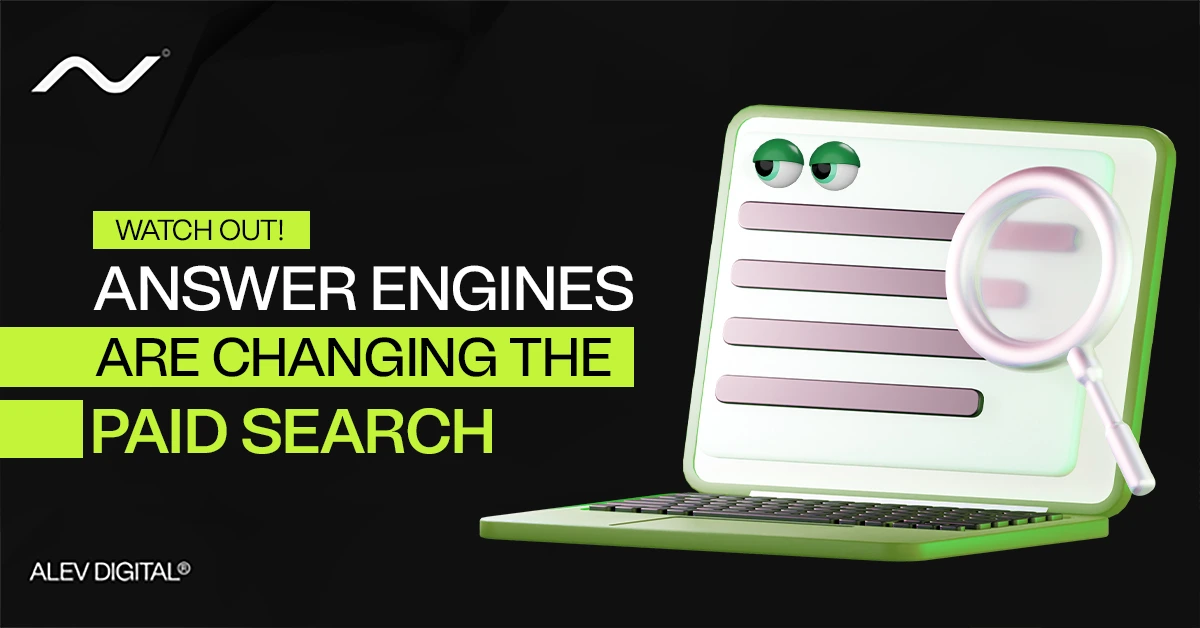It feels like answer engines have taken charge of revamping everything in town, including the search engine algorithm. Not too long ago, paid search was all about bidding high, tweaking ad copy, and seeing the traffic come in. But now, Answer engines have changed everything. Voice assistants, ChatGPT, and Google’s AI-driven search aren’t just ranking results. Since users prefer direct and precise answers, user behaviors are on a dynamic shift!
If the users wish for an effortless browsing experience, the businesses spending on paid advertising are at a significant loss. So your ideal placement on search results is number 1, an absolute high search match! That being said, the bars are set high for online advertising. We’re moving away from getting clicks to focusing on answer engine optimization. If your business isn’t keeping up with this change, you might spend all your money on ads that no one is interested in clicking.
If you do not already know, then you must wonder what AEO is and how it impacts paid searches. Things are out of SEO’s hands already, with answer engines currently ruling the web searches.
What Are Answer Engines, And How Do They Work?
Wouldn’t it be easy if you could just enter a query in the search engine, skip endless boring results, and receive direct answers? Answer Engine Optimization (AEO) is about structuring your content so that AI can grab it quickly. If your content isn’t set up for AEO, it could get overlooked in this new search vibe.
Instead of listing many links, answer engines provide quick and direct answers. They use voice assistants, Google’s featured snippets, and chatbots to get precise information, reducing users’ need to click on unnecessary links. Based on how it functions, it is evident that it connects search intent and user experiences.
Answer engines use AI, machine learning, and structured data to understand user queries and find the correct information from knowledge graphs, databases, and well-optimized content. Answer Engine Optimization (AEO) helps businesses create clear, direct answers, use schema markup, and cite trustworthy sources. This makes it easier for AI systems to show their information to users.
Why Paid Search Will Be Impacted by Answer Engines?
After realizing that answer engines are changing consumer behaviors, it means that current ad copies and ad creatives might not work well with a growing or changing consumer mindset, right? Things are getting interesting with machine learning, and PPC and traditional paid advertising are fading. There is a dire need to adapt and quickly figure out ways of adding newness and interactiveness that users demand.
As answer engines become more competent, businesses must avoid paid searches and create content to provide users with instant answers. This means companies must rethink their search engine marketing (SEM) strategies. Instead of counting on paid clicks, they will focus on optimizing for Answer Engine Optimization (AEO). If you want to stay in the game and maintain visibility, embracing AEO will be key, especially as we move away from relying entirely on paid traffic.
How Does Answer Engines Differ From Search Engines?
Search engines provide users with information by showing relevant web pages. When we ask a query in search engines, we end up with a long list of web results to surf through. For instance, Google. It’s the most widely used search engine that allows users to enter queries and receive a list of relevant websites and content. Other examples include Bing and Yahoo!
Answer engines skip all that. Instead of showing options, they instantly pull the exact answer and give it to you. No extra steps, no clicking around. For instance, when we add a query in the Google search engine, you’ll see a featured snippet at the top that leads you to a quick answer straight from the web. This allows users to receive their desired information without clicking a link.
Key differences? Search engines return a long list of website pages to scroll and click through. On the other hand, answer engines provide direct and precise answers without needing to click on many links. Search engines also prioritize ranking websites, whereas answer engines focus more on extracting concise answers that match users’ search intent.
Importance of Answer Engines for Paid Search
Increased change in customer behavior is changing online marketing goals. Hence, the paid search is undergoing a massive change. Answer engine optimization has changed how users interact with search results. If your business heavily depends on paid advertising for visibility with your target audience, consider rethinking your search engine marketing (SEM) strategy
AEO has cut down on ad clicks because people get instant answers now. Businesses have changed how they do search engine marketing. Taking note of these things is essential:
• Decreased Ad Clicks: Immediate responses diminish user interaction with conventional PPC advertisements.
• Change in SEM Approach: Companies need to enhance their strategies for answer engines to preserve their visibility.
• AEO is Crucial: Answer Engine Optimization (AEO) enables brands to maintain relevance in AI-driven search.
• Content is Crucial: Well-organized, informative content is essential for being featured in AI-generated responses.
Get in Touch with Alev for Trendy Online Advertising
Answer engines are shaking things up for traditional PPC. User intent with searches has totally taken a shift; now, users expect quick and direct answers without having to scroll through countless links. In times like these, how can your small business stay ahead?
The catch here is to stop relying on just paid search; small businesses need to integrate answer engine optimization into their search engine marketing strategies. That’s what Alev does: We blend PPC, AEO, and SEM to ensure your business stays ahead.
Frequently Asked Questions
Response engines offer direct answers, minimizing users' need to engage with advertisements. This implies that PPC campaigns must progress, concentrating on organized content and Answer Engine Optimization (AEO) to uphold visibility in AI-driven search outcomes.
SEO seeks pages in search results, whereas AEO (Answer Engine Optimization) guarantees that content is organized for AI-based searches. AEO enables companies to be featured in Google’s Featured Snippets, voice search outcomes, and AI-created responses without depending on conventional search rankings.
Although paid advertising is here to stay, companies need to adjust their search engine marketing (SEM) approaches. Response engines emphasize immediate answers; thus, optimizing AEO with PPC keeps businesses prominent, even as AI-based search develops.
Companies should implement structured data, prioritize brief responses, and bolster brand authority to feature in AI-created outcomes. Applying AEO strategies guarantees that content is understandable for search AI and has a higher chance of being included in instant answers.
Alev Digital merges PPC, AEO, and search engine marketing (SEM) to assist companies in maintaining visibility in AI-powered searches. We enhance content for answer engines, guaranteeing that brands show up in Google’s AI-produced outcomes, Featured Snippets, and voice queries, optimizing both organic and paid search effectiveness.





